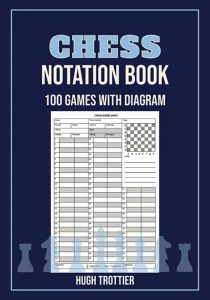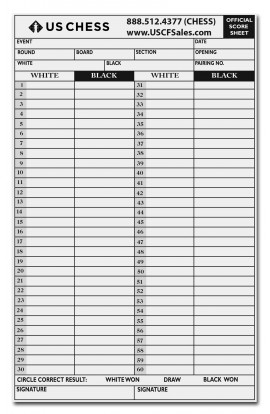South Sound Chess provides official two-copy US Chess Federation scoresheets for our players at no charge.
These scoresheets allow you to write in pen on the top page and have a copy made on the backing sheet, which is typically yellow. After the game, both players sign the other’s sheet, circle the result, and both players submit their yellow sheet to the Tournament Director while keeping the top white scoresheet for themselves.
So… what’s notation all about?
Why is keeping notation a good idea?
There are several reasons you should keep solid chess notation in USCF events:
- It allows you to claim a three-repetition draw
- It keeps both the history and the current state of the game preserved for arbiters to review in case of any dispute over the chess board
- It gives you a hard copy to take home and analyze using your chess programs or engine like Scid vs. PC, Chessbase, or Lichess Studies
When do I have to keep notation?
You are not required to keep notation in Quick/Rapid and Blitz games under the USCF rules. For South Sound Chess, this applies to our Open Blitz and Rapid Quads tournaments.
You are required to keep notation for any event that is partially or fully rated as a Regular/Classical event. Again, for our chess club, this applies to our Single Classical games and our Dual-Rated Games, because both qualify for Regular USCF Rating points, even though the Dual-Rated Games also qualify for Quick/Rapid.
This means you must use a scoresheet that we provide from the club or you bring your own – chess notation books are common amongst scholastic players so they can review games with their coach:

While you are taking notation, if either player falls below 5 minutes on their clock, both players can stop taking notation. It does not matter which player falls below 5 minutes, or if the player goes above 5 minutes after that time via increment or time control bonus – both players in the chess game can stop taking notation at that time.
It is highly recommended that players take notation throughout the entire game no matter what their time situation is, as it helps your career in analyzing the games later as well as helps the arbiter in case of any disputes over the board.
I don’t know how to take notation, can I simply not do it?
No, this is not a valid reason. You must take notation in USCF Rated Regular/Classical games, no matter what.
A good way to practice taking notation is to play online unrated games with a Rapid or slower time control and simply write down notation on a piece of paper or scoresheet while you do so. After the game, compare your notes with the computer’s notation and see where you got things wrong.
If you do not take notation or stop taking notation before the 5 minute threshold, you will be subjected to a time penalty, the amount of which is at the discretion of the tournament director. Typical time penalties for a hybrid game would be about five minutes docked from your clock, while in a Regular/Classical slow game, you could lose up to fifteen minutes.
Are there any exceptions?
There are two specific exceptions the USCF gives for not taking chess notation in rated games:
- Inability to keep score due to physical limitations
- Religious exemptions (when no one can help them take score)
In these cases, the tournament director can withhold the penalty. However, these players still will be unable to claim a three-repetition draw and will be disadvantaged in disputes in the game when the arbiter reviews the scoresheets.
Long story short, keep notation! It helps you improve and protects the integrity of the game.
